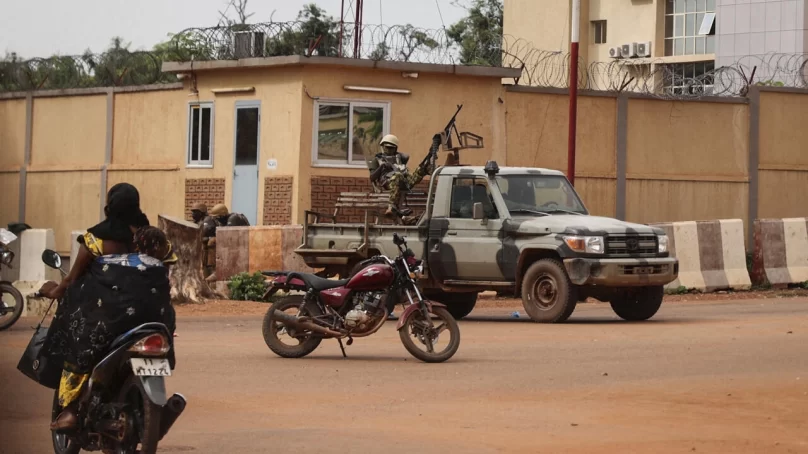
Gunfire rang out early Friday in Burkina Faso’s capital and the state broadcaster went off the air, sparking fears of a mutiny nine months after a military coup d’état overthrew the country’s president.
Shots and a large blast were heard around Burkina Faso’s presidential palace and the headquarters of its military junta, which seized power in a coup last January. The state broadcaster is functioning intermittently.
It was not immediately known where Lt-Col Paul Henri Sandaogo Damiba was in the West African country. He had given a speech the day before in Djibo, in the north of Burkina Faso.
Several main roads in the capital Ouagadougou were blocked by troops on Friday and the Burkina Radio and Television Broadcasting Company (RTB) has been off the air for much of Friday.
“I heard heavy detonations around 4:30 am and now the roads around my home have been sealed off by military vehicles,” a resident who lives close to the presidential palace told AFP. A large blast was later heard near the presidential palace where armed soldiers have taken positions
Last week, Damiba had travelled to New York where he addressed the UN General Assembly as the country’s coup leader-turned-president. In his speech, Damiba defended his January coup as “an issue of survival for our nation,” even if it was “perhaps reprehensible” to the international community.
Troops were stationed on the main crossroads of the city, especially in the Ouaga 2000 neighbourhood that is home to the presidential and military junta headquarters, but also outside RTB headquarters.
A security source told RFI correspondent Yaya Boudani that the gunfire was linked to “demands”, without providing further details. Burkina Faso is currently led by a military junta under Lt-Col Paul-Henri Sandaogo Damiba.
On Thursday, hundreds of people took to the streets in the city of Bobo Dioulasso in the west of the country, demanding his resignation. A spokesperson for the interim presidency told France 24 that Damiba was unhurt in Friday morning’s gunfire.
Burkina Faso’s coup came in the wake of similar takeovers in Mali and in Guinea, heightening fears of a rollback of democracy in West Africa. None of the juntas has committed to a date for new elections, though Damiba said last week that the transition in Burkina Faso would last for almost two more years.
Many in Burkina Faso initially supported the military takeover, frustrated with the previous government’s inability to stem Islamic extremist violence that has killed thousands and displaced at least two million. Yet the violence has failed to wane in the months since Damiba took over. Earlier this month, he also took over the position of defence minister after dismissing a brigadier general from the post.
The cause of the gunfire and the detonations was not immediately clear, but sources say police and military are increasingly unhappy with Damiba’s handling of security. It comes just four days after unknown assailants attacked a convoy in the north of the country, killing 11 soldiers. Around 50 civilians are missing.
Several posts on social media indicated that Lieutenant-colonel Zoungrana had instigated what some are calling a mutiny. Zoungrana was arrested in January this year, suspected of preparing a military coup.
The junta took power in a coup on 24 January, 2022, ousting President Roch Kabore and dissolving the government. In his first statement at the time, coup leader Damiba vowed to restore security after years of violence carried out by Islamist militants linked to al-Qaeda and Islamic State.
But the security situation has not improved. More than 40 percent of the country, a former French colony, is outside government control. Thousands have died and about two million have been displaced by the fighting since 2015 when the insurgency spread into Burkina Faso.
Much of the Sahel region is battling the insurgency, which began in neighbouring Mali in 2012 and which also spread to Niger. In recent years, the violence has begun to spill over into coastal states Cote d’Ivoire and Togo.
- A Tell / AP report, addition reporting RFI and France 24.











